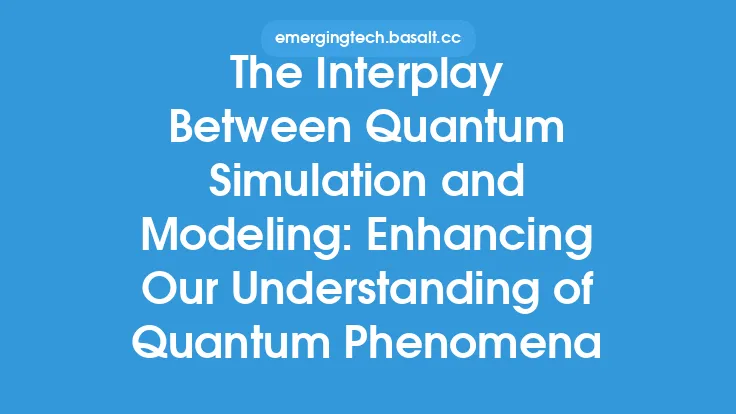The study of complex quantum systems has long been a challenging task due to the inherent difficulties in simulating and modeling their behavior. However, recent advances in quantum simulation have enabled researchers to overcome some of these challenges, paving the way for a deeper understanding of quantum phenomena. Quantum simulation refers to the use of a controlled quantum system to mimic the behavior of another quantum system, allowing researchers to study complex quantum phenomena in a more controlled and efficient manner.
Introduction to Quantum Simulation
Quantum simulation is a powerful tool for studying complex quantum systems, as it allows researchers to create a controlled environment that can mimic the behavior of a wide range of quantum systems. This is particularly useful for studying systems that are difficult or impossible to study using traditional experimental techniques. Quantum simulation can be performed using a variety of platforms, including ultracold atoms, trapped ions, and superconducting circuits. Each of these platforms has its own unique advantages and disadvantages, and the choice of platform depends on the specific system being studied.
Quantum Simulation Techniques
There are several techniques that can be used to perform quantum simulation, including analog simulation, digital simulation, and hybrid simulation. Analog simulation involves using a controlled quantum system to directly mimic the behavior of the system being studied. This approach is useful for studying systems that have a simple and well-understood Hamiltonian. Digital simulation, on the other hand, involves using a series of discrete operations to simulate the behavior of the system being studied. This approach is more flexible than analog simulation and can be used to study a wider range of systems. Hybrid simulation combines elements of both analog and digital simulation, allowing researchers to take advantage of the strengths of each approach.
Applications of Quantum Simulation
Quantum simulation has a wide range of applications, from the study of complex quantum systems to the development of new quantum technologies. One of the most promising applications of quantum simulation is in the study of quantum many-body systems. These systems are characterized by strong interactions between particles, and their behavior is often difficult to predict using traditional theoretical techniques. Quantum simulation provides a powerful tool for studying these systems, allowing researchers to gain insights into their behavior and properties. Quantum simulation is also being used to study the behavior of quantum systems in the presence of noise and errors, which is an important challenge in the development of quantum computing and other quantum technologies.
Quantum Simulation and Quantum Computing
Quantum simulation is closely related to quantum computing, as both fields rely on the use of controlled quantum systems to perform complex calculations. However, while quantum computing is focused on the development of algorithms and hardware for performing specific calculations, quantum simulation is focused on the study of complex quantum systems. Quantum simulation can be used to study the behavior of quantum systems that are relevant to quantum computing, such as quantum error correction and quantum algorithms. Additionally, quantum simulation can be used to develop new quantum technologies, such as quantum sensors and quantum communication systems.
Challenges and Limitations of Quantum Simulation
Despite the many advances that have been made in quantum simulation, there are still several challenges and limitations that must be overcome. One of the main challenges is the development of scalable and reliable quantum simulation platforms. Currently, most quantum simulation platforms are small-scale and prone to errors, which limits their usefulness for studying complex quantum systems. Another challenge is the development of new techniques and algorithms for performing quantum simulation. As the field of quantum simulation continues to evolve, new techniques and algorithms will be needed to take advantage of the latest advances in quantum technology.
Future Directions for Quantum Simulation
The future of quantum simulation is exciting and rapidly evolving. One of the most promising areas of research is the development of new quantum simulation platforms, such as topological quantum computers and quantum simulators based on superconducting circuits. These platforms have the potential to provide a scalable and reliable way to perform quantum simulation, which could revolutionize the field. Another area of research is the development of new techniques and algorithms for performing quantum simulation. This could include the use of machine learning and artificial intelligence to improve the accuracy and efficiency of quantum simulation. Additionally, the integration of quantum simulation with other fields, such as materials science and chemistry, could lead to new breakthroughs and discoveries.
Conclusion
In conclusion, advances in quantum simulation have enabled researchers to study complex quantum systems in a more controlled and efficient manner. Quantum simulation is a powerful tool for studying quantum phenomena, and its applications range from the study of quantum many-body systems to the development of new quantum technologies. While there are still several challenges and limitations that must be overcome, the future of quantum simulation is exciting and rapidly evolving. As the field continues to advance, we can expect to see new breakthroughs and discoveries that will deepen our understanding of quantum phenomena and enable the development of new quantum technologies.





